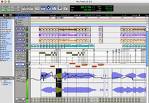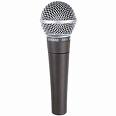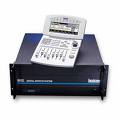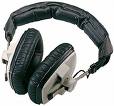Explaining
that in lay man's terms: high wattage will be
like a Rolls Royce going up a hill ... no problem
.... but a mini will struggle ...yeah? Also,
technically, the high wattage will have little
harmonic distortion ... so the sound will be clean
and pure. Just the opposite of a small
transistor radio at high level?

7)
The digital recording medium [bet you
thought the mic. was next?]
You
notice I did say 'digital'?
You
would be shocked at how many guys still record on
cassette ... on multi track cassette [remember those
8 track Tascam cassette recorders?].
Also,
there are many out there who seriously feel that
there is untold 'warmth' in tape recording.
They totally forget that the public are brainwashed
with superb, high quality digital recording... so,
tape recording would just sound dull and
horrible to them ... they are not old time
tape freaks. They are the modern day
record and download buying public - sorry!
So
which digital recording medium?
The
world industry standard is Pro Tools, no matter what
way you look at it, or which Music Newsgroup
you may contribute to ...
now.... Protools comes in two versions,
basically. The domestic/home studio version
which is massively powerful and generally supplied
by Digidesign. The starter version is, at the
moment, MBox2. This is a fully functional Pro
Tools which will operate on a Mac platform
[computer] or a PC platform. My suggestion
would be Mac, as it is vastly more powerful and
reliable ... used by EVERY major studio. Many
PC enthusiasts will argue backwards and
forwards and sideways about this fact.
But ask them a simple question:
"how much do you have in your bank
balance? From your music?"
The
next stage up would be my preferred Protools .. that
is Digidesign 003 currently. This provides 8
individual outputs for using outboard effects and
compression etc. MBox has only two outputs, so
is quite limited.

Protools
The
ultimate Protools is the HD version .... involving
massive hard disc capability and currently the most
powerful recording equipment in existence... with a
price to match...starting around £16,000.
With
open heart I would say that choosing anything less
is flawed. Logic is treated as the poor man's
Protools. But after that Cubase, Cakewalk,
Sonar, Reason, etc. are looked on as being amateur demo
equipment. The serious guys use Protools on a
massive Mac platform [now up to 8 processors working
in harmony]

8)
The Compressor [essential, in my view]
Now
we get on to the magic part of creating a
vocal. Not essential, and despised by a
lot of amateurs and novices.
Essential
in making a hit record sounding vocal.
The
reason, I feel that so many amateurs ignore
them, and/or despise them, is that they
simply do not know how to use them and
they certainly do not appreciate the
excitement they give to a vocal.
A
well used compressor will bring the entire
vocal up to a constant level. So there
should be no need to 'ride' the vocal
fader. Meaning pushing the fader up and
down for quiet and loud passages. A
professional singer will not give quiet and
loud passages as they will be skilled in
making a vocal 'sound' quiet whilst still
delivering the same 'loudness'. This is
essentially what a compressor will do.
The quiet parts will 'sound' quiet because the
timbre of the voice will change but audibility
of the vocal will be the same - you will have
no problem hearing it.
The
use of compressors has even gone further
now. They are used to provide hardness
and excitement. They will exaggerate
breathing noises and increase the sibilance.
They will give an indefinable edge to the
vocal which makes it altogether more
exciting. The vocal gets pushed forward
in front of the speakers.
 The famous TLA Audio Fatman
Fat 1
The famous TLA Audio Fatman
Fat 1
I won't go
into the details of the use of compressors
here, there are many fine articles on line
that will do that. My advice is to get a
compressor [my current favourite is the TLA
Audio Fatman - Fat 1 .. stereo valve driven
compressor much favoured in top Hip hop
circles]. Just use it ... experiment
with it. There are presets in the
machine which are so useable and also a manual
side where you can set your own settings.

9)
The mastering of the finished product [caught
you then?]
Mastering
is the black art that 99.99999% of home recordists
do not understand. It makes the difference
between a demo and a finished ready to make dosh
record.
And
don't even think of using a computer finalising
programme or even the Finaliser hardware ...
mastering is a job for the experts in the dedicated
mastering suite ... which, incidentally, will simply
have the speakers and little else in, except the
essential equipment. Mastering is never
performed in a recording studio. We are talking
here of making 'perfect' product ready for
duplication and onward sale to the Public.
The
'Sadie' equipment is much favoured, but most guys
now use very powerful dedicated mastering software
through Protools on hugely powerful Mac computers. The software
will generally be self powered, meaning that it does
not depend on the CPU [Computer Processing Unit] of
the computer... generally cost around £2,000 a
card.
Sadie
is still used for placing the start points of each
track and for bringing the whole track up to maximum
DB [Decibels] of sound volume.

10)
The skill of the vocal track editor
This is a skilled
job. If the artist has had many 'drop-ins' ..
meaning that many parts of the vocal had mistakes,
bad tuning etc. that had to be replaced, then there
will inevitably be clicks, bumps and evidence,
through breathing difference, that the track was
much edited.
This is where Pro
Tools shows it's power. There is an automatic
programme which will strip the sound
between each vocal line ... called 'strip
silence'. This is wonderful and quick - if no
breath is required ... in, such as, a dance track.
If
breath sound is required then the genius vocal track
editor comes in. He can spend hours cross
fading tracks and being a perfectionist, so that no
one would ever believe that the vocal track was not
all done in one go.
Of course, he
will come into his own with the multi tracked vocal
arrangement where there will be so much extraneous
noise, bumps and clicks. He will clean up the
start and finish of each phrase and make them all
'perfect'. As a vocal arrangement 'expert' I
tend to do this editing myself.
He will also make sure
that the entire vocal track is sounding at the same
level.
Sometimes a vocalist will be required
to come in a few days after the session to correct a
mistake. It then requires a skilled track
editor to make the new section sound the same and
appear the same level as the rest of the vocal track
... this involves great skill and knowledge.
In
'comping', meaning composing a final track from a
number of complete versions of the vocal track, a
track editor has to be incredibly switched on. It is
complex, requiring skill and the ability to remember
various sections of tracks and, of course, taking
accurate notes. Comping is essential where an
artist or musician insists that they want to do an
entire take on the song. They may do twenty
takes and the track editor will have to piece
together the best of each track... complex?
I personally hate working
like that and prefer to correct and drop in as
the vocal session progresses. That way I
know that I have a complete, perfect vocal
track before the vocalist leaves the studio.
With comping, the vocalist will issue the
immortal words: "you have enough
there to work with, I have to go now and
holiday in the Bahamas/have a brain
operation/scratch my bum/go to a great
party" ... take
your pick from any of those 'lazy' excuses.
|
All
members of The Serious Writers Guild
can call Dec direct on his private
phone line to his desk to discuss any
points. |

11)
The microphone [at last we got to it ... did
you put it first?]
You
will want to drive down to Eastbourne in the South
of the UK and hit me when you hear the professional
opinion of the importance of microphones.
Unless
you are recording Andrea Bocelli with a symphony
orchestra or a choir at Kings College then the
microphone is of little importance.
Getting
back to the first and most important point - the
performance of the vocalist, the microphone simply
captures that magic. You heard me say "sh*t in - sh*t
out" .... that is precisely what happens.
Most
microphones will capture sounds from 30Hz to
20,000Hz. The vocal frequency range is thought to be
200Hz to 2,000Hz. So, it goes without saying,
that any microphone will 'grab' that range of
frequencies. And that is what a microphone
does... it 'grabs' the frequencies.
The
difference between the various microphones is that
the graph of the fluidity [my that is a complex
word?] of the receiving of the sound can be
different ... only slightly, but enough for some
folk to notice.
For instance, the
renowned Shure SM58 will accept more in the high
mids, which has resulted in it being the industry
standard for vocals, throughout the world, in almost
every live situation [and even recording - Manic
Street Preachers?].
 Neumann Condenser
Mic.
Neumann Condenser
Mic.
 Shure SM58
Shure SM58
Various artists,
with knowledge of their own voices, will have found
the ideal mic. to suit their voices and be in a
position to demand that mic. whenever they perform.
BUT.................
And
this is a huge but......
Move half
an inch to the left or right of a microphone and it
will sound totally different ... likewise move
forward or backward and it will sound different
[this is called proximity effect]
Where
superb fidelity is called for, Bocelli or the world
class choir, then condenser mics. are the order of
the day. Mainly because they should have a very low noise
floor ... meaning that they have practically zero
inherent self noise. That is what you pay
for. So, in an ultra quiet moment there should
be total silence. BUT ....
When used in a
home studio they can pick up all sorts that you
don't want to hear ... my problem is seagulls as I
live close to the sea! The sea views are
beautiful but I could shoot those little
birdies sometimes. Especially at nesting
time.
It is worth
understanding that, in a modern Pop recording we
will use so much compression and effects that it is
easy to forget, completely, what microphone was used
in the first place ... I know - that happens to me
often.

12)
The preamp [the worry of all novices?]
I will own up now and say
that I have only used a pre amp in one studio
in my life.
That was in conjunction
with a mega expensive Neumann microphone.
It took me about 45 minutes to get a half
decent vocal sound .... so.... never again.
I tell a lie, I did use a
Joe Meek pre amp. another time, in my own
studio ... at the request of a
friend. Again with a Neumann ... same
deal! Hours of agony. And the
noise? The results reminded me of a
demented horse falling down a well.
I find that when I just
plug a few mics. straight into my Protools or
Roland VST [my favourite for quick easy work]
then I choose the best mic. for the job and
get going quickly. I have never yet seen
any difference between mics. plugged straight
in and mics. plugged into a preamp.
The accepted idea of
preamps is that they are super clean and quiet
in operation, with a desperately low noise
floor. So therefore, in theory, if you
plug in a mic. with a similar low noise floor
and then by-pass the preamp of the mixing desk
or the analoque/digital interface going to the
recording computer programme, then the result
should be super quiet. Some preamps will
have compressor/limiter built in and a very
detailed EQ [equalization or tone controls] so
you can give the vocal a lot of attention as
it is being recorded.
The big 'however' here is
that once compression is applied it cannot be
removed later ... so it is dangerous to record
in this fashion, save having a light limiting
setting. That means the mic. will not,
in theory, overload the system when recording,
so you never miss that 'magic' take through
distortion.
Similarly with EQ.
Most experienced engineers and producers will
record the vocal flat [no EQ] and leave
the changes, if they are necessary, until the
mixing stage .... So .... should you use
a preamp? In my view they are not
necessary.

13)
The Effects Unit/Units [extremely dangerous]
I
say extremely dangerous for good reason.
Most of the Demos I get sent through our 'Demo
Consultation Service' either have too
much of an old fashioned reverb or echo or
they have too little.
Reverb
and effects use is only learned through study
of the units involved and by constant study of
the effects currently used on chart
records. Then it is down to daily use.
Of
course,
it goes without saying that you must have a
unit that is user adjustable.
Most
of the smaller desks designed for small home
studios or small live rigs will have built in
digital effects. Sadly, they are not
very usable. The Behringer range, for
instance, have all the reverbs set too
long. This is sad as I have a soft spot
for these excellent mixers.
Likewise,
older units like the Alesis Quadraverb had
very usable patches but had quite a high noise
floor [inherent noise]. It also had a
grainy sound, compared with the current crop
of units.
Roland are not
known for their effects units but produced the
elderly but excellent SRV-3030 .. they also
include beautiful effects on their VST
[Virtual Studio series of hard disc
recorders] They include the almost
essential RSS [Roland Stereo Sound] effects
which throw the sound way out past the stereo
speakers .... as used in almost every girl Hip
Hop record.
The most
expensive effects units currently are the
Lexicon 960 and the Digitech lookalike of the
same unit. As used by Il Divo.
Pure, clean, transparent.
 Could you afford this
Lexicon 960?
Could you afford this
Lexicon 960?
My
advice would be:
1)
Get to know the various Industry Standard
units ... study the manuals [available on the
Net].
2)
Realise that a normal small studio will have a
Lexicon 480 [or the latest 960] but the
engineer will not have bothered to learn how
to use it and simply give you more or less of
the patch that is set as standard for
everyone.
3)
Understand that a unit will sound
totally different in a live situation.
The current best, for live work, in my view,
is the Alesis Midiverb 4 ... quite the best I
have ever heard ... and not expensive.
4)
Learn how to adjust the echo length and/or
the predelay length to the tempo of the
song. In rough terms divide the BPM
[beats per minute] into 60 to give you the
millisecond delay for a quarter note
[crotchet]. You can then divide or multiply
this by 2 or 4 to give the required effect.
5)
Learn the use of 'chorus' to fatten
vocals, particularly back vocals and vocal
arrangement ... also the use of RSS.
6)
Understand that normal reverb will push the
vocal back into the speakers. Using
predelay or a unit giving an echo with the
reverb after the echo will ensure that the
vocal is clean and upfront with the reverb
tailed behind.
7)
Understand that computer 'plug in's'
are low quality, of necessity, as they use the
CPU [computer processing unit] of the
tower. You will run out of recording
power very quickly unless you are using the
self powered cards as described above.
You will have to tell me how you afford
these? Drugs? Arranging wars in
Africa? Selling your sister?

14)
The Earphones Used [there is only one
Industry Standard
The
reason we only use one type of earphones
[Beyer Dynamic DT100] is that every
studio in the world uses them, so no
matter where you record you will have the same
earphone sound. They are high SPL [Sound
Pressure Level or volume] and should not
distort in any way even at their
loudest. They are also clear and have a
well defined frequency range which is
excellent for reproducing vocals.
Most
producers and free lance engineers will carry
their own sets [just in case the studio does
not have them].
The
all enclosing ear-pads make them the best for
recording vocals as no music spill should get
into the microphone unless they are at
earsplitting, blood boiling, kidney shattering
level ... but you wouldn't do that would you?
 Absolutely the Industry
standard
Absolutely the Industry
standard
Many
novices will spout on about the benefits of
various other earphones but don't ever be
tempted to stray from Beyer DT100. Beyer
do an extended bottom end version [DT150] but
I would not advise ever straying.
|
All
members of The Serious Writers Guild
can call Dec direct on his private
phone line to his desk to discuss any
points. |